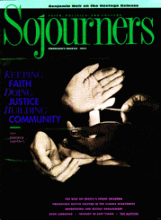I read a lot of depressing articles these days about children growing up in U.S. ghettos. But Jeanne Schinto's Children of Men (Persea Books, 1991, $19.95, cloth) is the first novel I've come across in which the voice of an inner-city teen-ager narrates her own story, blasting away stereotypes yet confirming brutal realities in the process. While Children of Men is not an autobiographical novel, Schinto did grow up in an inner-city Washington, D.C. neighborhood similar to the one portrayed in the book, and the stories of narrator Cathy Ashwell have the ring of lived--or closely observed--truths.
Cathy is a double outcast--a white girl in an all-black neighborhood within sight of the "greenish-silver" capitol dome. One of a large hillbilly clan, she is a compelling character, believable in her quirkiness, who speaks to the reader like a friend ("Did you hate gym like I did?"). Both her toughness and her fear--and the dangers that surround her--come through every word. School is where boys sexually harrass Cathy; the streets are where drug dealers beat passersby to death with chains and pimps eye her from doorways, calculating her worth.
Home for Cathy is a rickety island of safety, and Schinto brings "123 Tennessee Avenue" alive through coarse details--what the family eats for supper, which foods were bought and which shoplifted, how tight sleeping arrangements shift to accommodate an extra body. Every Ashwell is a well-drawn character, each trying in their own way (through crime, prostitution, or hard work) to break out of poverty.
Read the Full Article

